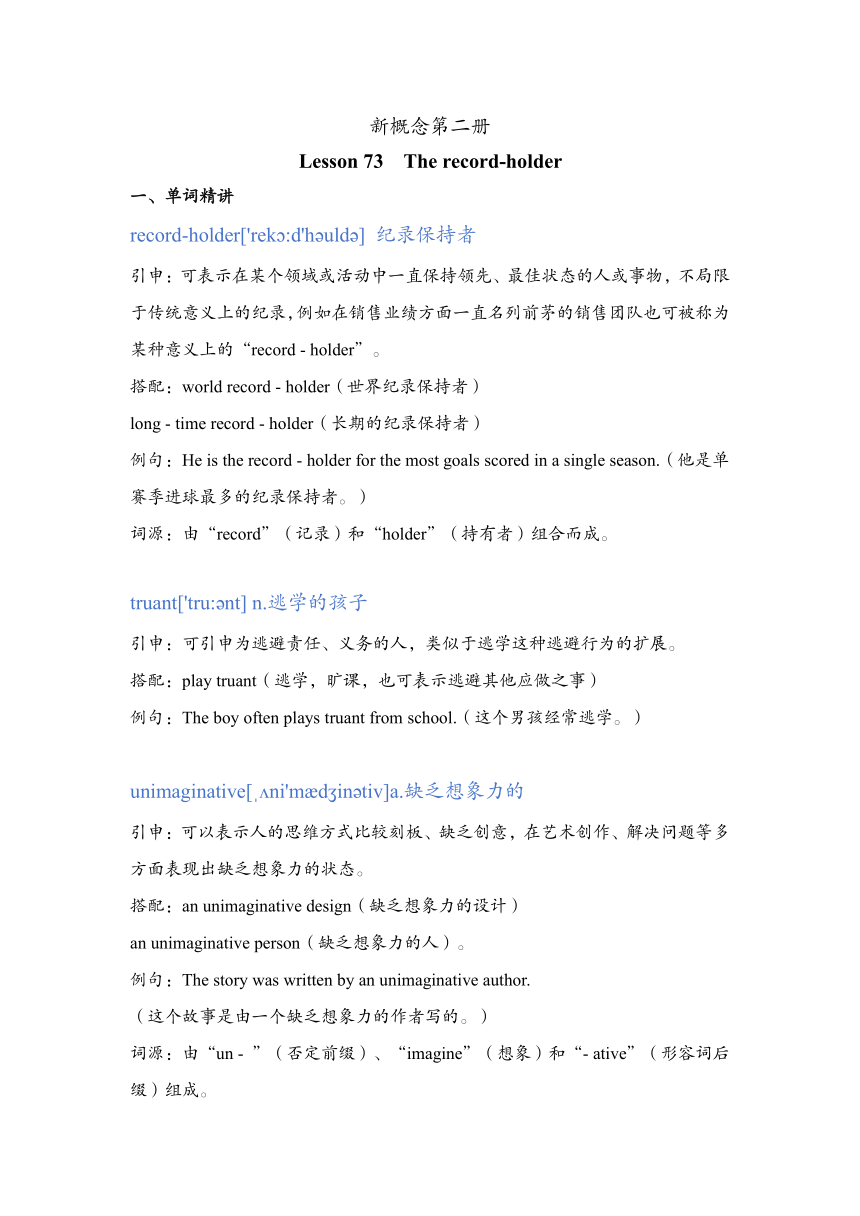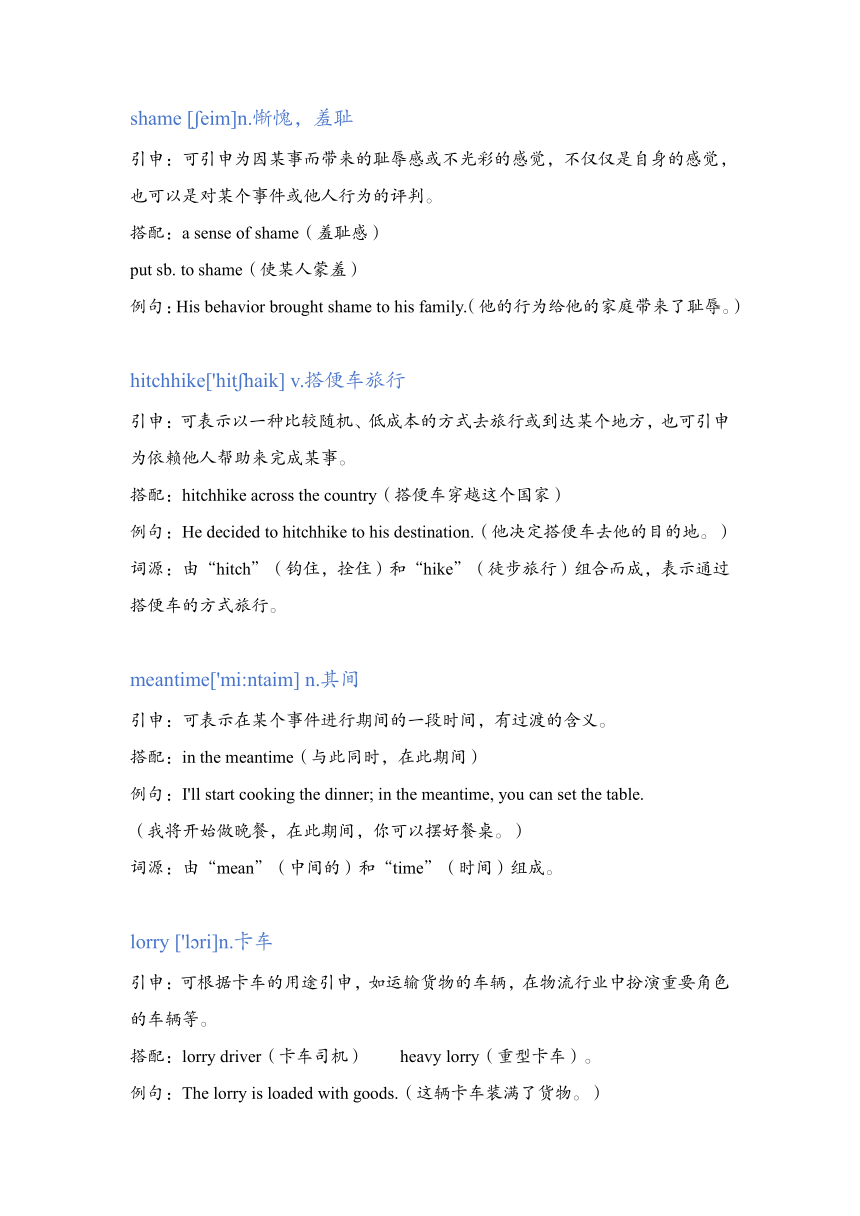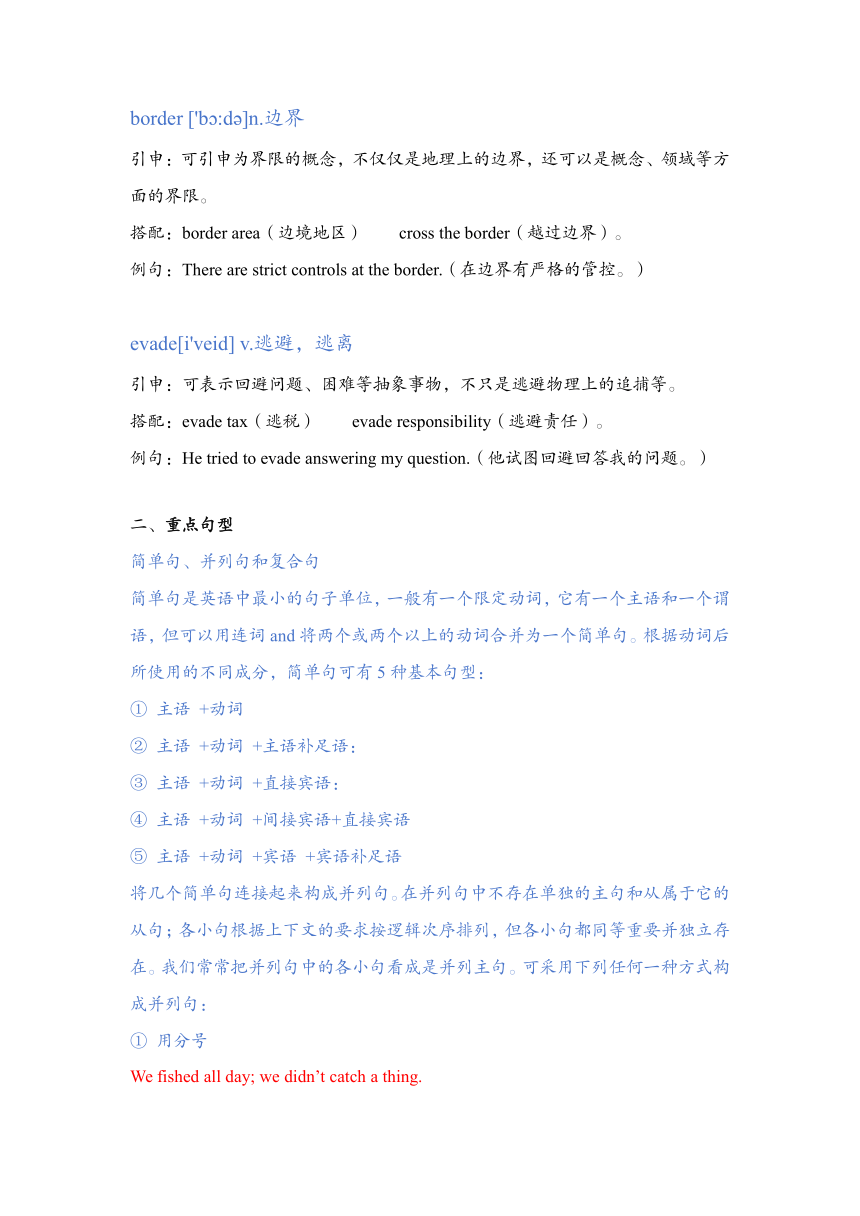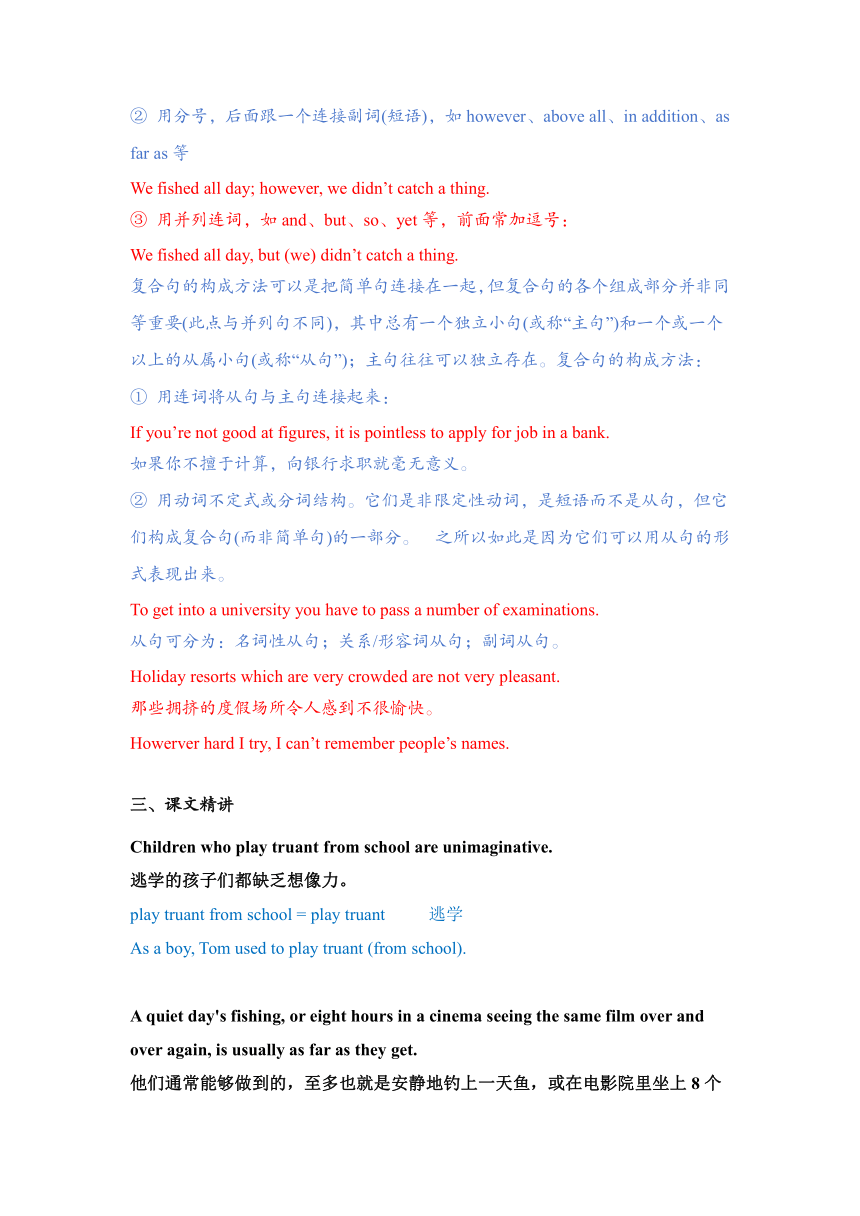新概念第二册Lesson 73 The record-holder讲义
文档属性
| 名称 | 新概念第二册Lesson 73 The record-holder讲义 |  | |
| 格式 | docx | ||
| 文件大小 | 129.2KB | ||
| 资源类型 | 教案 | ||
| 版本资源 | 新概念英语 | ||
| 科目 | 英语 | ||
| 更新时间 | 2024-11-24 21:37:34 | ||
图片预览




文档简介
新概念第二册
Lesson 73 The record-holder
单词精讲
record-holder['rek :d'h uld ] 纪录保持者
引申:可表示在某个领域或活动中一直保持领先、最佳状态的人或事物,不局限于传统意义上的纪录,例如在销售业绩方面一直名列前茅的销售团队也可被称为某种意义上的“record - holder”。
搭配:world record - holder(世界纪录保持者)
long - time record - holder(长期的纪录保持者)
例句:He is the record - holder for the most goals scored in a single season.(他是单赛季进球最多的纪录保持者。)
词源:由“record”(记录)和“holder”(持有者)组合而成。
truant['tru: nt] n.逃学的孩子
引申:可引申为逃避责任、义务的人,类似于逃学这种逃避行为的扩展。
搭配:play truant(逃学,旷课,也可表示逃避其他应做之事)
例句:The boy often plays truant from school.(这个男孩经常逃学。)
unimaginative[ ni'm d in tiv]a.缺乏想象力的
引申:可以表示人的思维方式比较刻板、缺乏创意,在艺术创作、解决问题等多方面表现出缺乏想象力的状态。
搭配:an unimaginative design(缺乏想象力的设计)
an unimaginative person(缺乏想象力的人)。
例句:The story was written by an unimaginative author.
(这个故事是由一个缺乏想象力的作者写的。)
词源:由“un - ”(否定前缀)、“imagine”(想象)和“- ative”(形容词后缀)组成。
shame [ eim]n.惭愧,羞耻
引申:可引申为因某事而带来的耻辱感或不光彩的感觉,不仅仅是自身的感觉,也可以是对某个事件或他人行为的评判。
搭配:a sense of shame(羞耻感)
put sb. to shame(使某人蒙羞)
例句:His behavior brought shame to his family.(他的行为给他的家庭带来了耻辱。)
hitchhike['hit haik] v.搭便车旅行
引申:可表示以一种比较随机、低成本的方式去旅行或到达某个地方,也可引申为依赖他人帮助来完成某事。
搭配:hitchhike across the country(搭便车穿越这个国家)
例句:He decided to hitchhike to his destination.(他决定搭便车去他的目的地。)
词源:由“hitch”(钩住,拴住)和“hike”(徒步旅行)组合而成,表示通过搭便车的方式旅行。
meantime['mi:ntaim] n.其间
引申:可表示在某个事件进行期间的一段时间,有过渡的含义。
搭配:in the meantime(与此同时,在此期间)
例句:I'll start cooking the dinner; in the meantime, you can set the table.
(我将开始做晚餐,在此期间,你可以摆好餐桌。)
词源:由“mean”(中间的)和“time”(时间)组成。
lorry ['l ri]n.卡车
引申:可根据卡车的用途引申,如运输货物的车辆,在物流行业中扮演重要角色的车辆等。
搭配:lorry driver(卡车司机) heavy lorry(重型卡车)。
例句:The lorry is loaded with goods.(这辆卡车装满了货物。)
border ['b :d ]n.边界
引申:可引申为界限的概念,不仅仅是地理上的边界,还可以是概念、领域等方面的界限。
搭配:border area(边境地区) cross the border(越过边界)。
例句:There are strict controls at the border.(在边界有严格的管控。)
evade[i'veid] v.逃避,逃离
引申:可表示回避问题、困难等抽象事物,不只是逃避物理上的追捕等。
搭配:evade tax(逃税) evade responsibility(逃避责任)。
例句:He tried to evade answering my question.(他试图回避回答我的问题。)
重点句型
简单句、并列句和复合句
简单句是英语中最小的句子单位,一般有一个限定动词,它有一个主语和一个谓语,但可以用连词and将两个或两个以上的动词合并为一个简单句。根据动词后所使用的不同成分,简单句可有5种基本句型:
① 主语 +动词
② 主语 +动词 +主语补足语:
③ 主语 +动词 +直接宾语:
④ 主语 +动词 +间接宾语+直接宾语
⑤ 主语 +动词 +宾语 +宾语补足语
将几个简单句连接起来构成并列句。在并列句中不存在单独的主句和从属于它的从句;各小句根据上下文的要求按逻辑次序排列,但各小句都同等重要并独立存在。我们常常把并列句中的各小句看成是并列主句。可采用下列任何一种方式构成并列句:
① 用分号
We fished all day; we didn’t catch a thing.
② 用分号,后面跟一个连接副词(短语),如however、above all、in addition、as far as等
We fished all day; however, we didn’t catch a thing.
③ 用并列连词,如and、but、so、yet等,前面常加逗号:
We fished all day, but (we) didn’t catch a thing.
复合句的构成方法可以是把简单句连接在一起,但复合句的各个组成部分并非同等重要(此点与并列句不同),其中总有一个独立小句(或称“主句”)和一个或一个以上的从属小句(或称“从句”);主句往往可以独立存在。复合句的构成方法:
① 用连词将从句与主句连接起来:
If you’re not good at figures, it is pointless to apply for job in a bank.
如果你不擅于计算,向银行求职就毫无意义。
② 用动词不定式或分词结构。它们是非限定性动词,是短语而不是从句,但它们构成复合句(而非简单句)的一部分。 之所以如此是因为它们可以用从句的形式表现出来。
To get into a university you have to pass a number of examinations.
从句可分为:名词性从句;关系/形容词从句;副词从句。
Holiday resorts which are very crowded are not very pleasant.
那些拥挤的度假场所令人感到不很愉快。
Howerver hard I try, I can’t remember people’s names.
课文精讲
Children who play truant from school are unimaginative.
逃学的孩子们都缺乏想像力。
play truant from school = play truant 逃学
As a boy, Tom used to play truant (from school).
A quiet day's fishing, or eight hours in a cinema seeing the same film over and over again, is usually as far as they get.
他们通常能够做到的,至多也就是安静地钓上一天鱼,或在电影院里坐上8个小时,一遍遍地看同一部电影。
动词ing前面如果出现定语,若是名词,则采用名词所有格或名词短语本身。
eight hours' seeing the film
非谓语动词做主语,一律作单数看。
Three hours in the room,It is tiring.
Three hours(') listening to the teacher is tiring.
Three hours in the room listening to the teacher is tiring.
Events such as the March 5th shooting at a high school in San Diego bring the problem into focus.
比如三月五日圣地亚哥一所高中学校发生的枪击事件问题成为焦点。
over and over again = again and again 一次又一次,一再地,反复许多次地
As my grandmother can’t hear very well, I had to say it over and over again.
as far as +从句 最大程度……,到……程度,就……而言
As far as I know, his operations successful.
They have all been put to shame by a boy who, while playing truant, travelled 1,600 miles.
而有那么一个小男孩,他在逃学期间旅行了1,600英里,从而使上述所有逃学的孩子们都相形见绌了。
while 引导时间状语从句,一般放在前面或后面,放在中间就加上逗号。while doing 省略句,省略了主语和be 动词,这个主语一定就是主句的主语。
put…to shame 使……蒙羞,使……相形见绌
What he has done put his parents to shame.
He saved the child at the risk of his own life and put all those who looked on to shame.
他冒着生命危险救了那个孩子,使所有旁观者都相形见绌。
He hitchhiked to Dover and, towards evening, went into a boat to find somewhere to sleep.
他搭便车到了多佛,天快黑时钻进了一条船,想找个地方睡觉。
hitchhike to… 搭便车去……
Dover n. 多佛(英国著名的港口)
towards evening 快到晚上
somewhere to sleep 可以睡觉的地方
anything to do/drink 可以做的事/可以喝的东西(这里to do 做定语)
When he woke up next morning, he discovered that the boat had, in the meantime, travelled to Calais.
第二天早上他醒来时,发现船在这段时间已经到了加。
wake up 自己醒来
Calais n. 加来(法国城市)
in the meantime 在此期间
I feel tired and would like to take a nap. In the meantime, you may do some reading.
No one noticed the boy as he crept off.
creep off = creep away
★creep
① vi. 爬行,匍匐,(像爬行似地)慢慢前进
The old car crept along the country road.
A snake crept into the garden while she was writing a letter.
② vi. 悄悄地/蹑手蹑脚地走;渐渐产生/出现
We crept upstairs so as not to wake Grandpa.
He noticed that age had crept on him.
From there, he hitchhiked to Paris in a lorry.从那里他又搭上卡车到了巴黎。
句子结构:主语是“He”,“From there”是地点状语,谓语是“hitchhiked”,宾语是“to Paris”,“in a lorry”是方式状语。
词汇精讲:“lorry”表示“卡车”,说明男孩搭便车的交通工具
The driver gave him a few biscuits and a cup of coffee and left him just outside the city.
司机给了他几块饼干和一杯咖啡,就把他丢在了城外。
句子结构:这是一个并列句,由“and”连接两个分句。第一个分句的主语是“The driver”,谓语是“gave”,间接宾语是“him”,直接宾语是“a few biscuits and a cup of coffee”;第二个分句的主语是“The driver”(承前省略),谓语是“left”,宾语是“him”,“just outside the city”是地点状语。
The next car the boy stopped did not take him into the centre of Paris as he hoped it would, but to Perpignan on the French-Spanish border.
男孩截住的下一辆车,没有像他希望的那样把他带到巴黎市中心,而是把他带到了法国和西班牙边界上的佩皮尼昂。
take … into 带到……
not…but… 不是……而是……
as sb. hoped 正如某人所希望的
I became a good teacher as my mother hopes.
than sb. expected 比某人所期待的还……
Don't ask what the country do for you, but ask what you do for the country.
the French-Spanish border 法国与西班牙的边界 (边界地带属于哪个地方由第一个国籍确定)
There he was picked up by a policeman and sent back to England by the local authorities.
他在那儿被一个警察抓住了,之后被当局送回了英国。
pick up 逮捕,拘捕
After the accident, he was picked up by the police.
He has surely set up a record for the thousands of children who dream of evading school.
他无疑为成千上万梦想逃避上学的孩子们创造了一项纪录。
句子结构:这是一个主从复合句。主句是“He has surely set up a record”,这是一个现在完成时结构,其中主语是“He”,谓语是“has set up”,宾语是“a record”;“for the thousands of children who dream of evading school”是目的状语,其中“who dream of evading school”是定语从句,修饰“the thousands of children”。
词汇精讲:“evade”表示“逃避”,“evading school”表示“逃学”。
Lesson 73 The record-holder
单词精讲
record-holder['rek :d'h uld ] 纪录保持者
引申:可表示在某个领域或活动中一直保持领先、最佳状态的人或事物,不局限于传统意义上的纪录,例如在销售业绩方面一直名列前茅的销售团队也可被称为某种意义上的“record - holder”。
搭配:world record - holder(世界纪录保持者)
long - time record - holder(长期的纪录保持者)
例句:He is the record - holder for the most goals scored in a single season.(他是单赛季进球最多的纪录保持者。)
词源:由“record”(记录)和“holder”(持有者)组合而成。
truant['tru: nt] n.逃学的孩子
引申:可引申为逃避责任、义务的人,类似于逃学这种逃避行为的扩展。
搭配:play truant(逃学,旷课,也可表示逃避其他应做之事)
例句:The boy often plays truant from school.(这个男孩经常逃学。)
unimaginative[ ni'm d in tiv]a.缺乏想象力的
引申:可以表示人的思维方式比较刻板、缺乏创意,在艺术创作、解决问题等多方面表现出缺乏想象力的状态。
搭配:an unimaginative design(缺乏想象力的设计)
an unimaginative person(缺乏想象力的人)。
例句:The story was written by an unimaginative author.
(这个故事是由一个缺乏想象力的作者写的。)
词源:由“un - ”(否定前缀)、“imagine”(想象)和“- ative”(形容词后缀)组成。
shame [ eim]n.惭愧,羞耻
引申:可引申为因某事而带来的耻辱感或不光彩的感觉,不仅仅是自身的感觉,也可以是对某个事件或他人行为的评判。
搭配:a sense of shame(羞耻感)
put sb. to shame(使某人蒙羞)
例句:His behavior brought shame to his family.(他的行为给他的家庭带来了耻辱。)
hitchhike['hit haik] v.搭便车旅行
引申:可表示以一种比较随机、低成本的方式去旅行或到达某个地方,也可引申为依赖他人帮助来完成某事。
搭配:hitchhike across the country(搭便车穿越这个国家)
例句:He decided to hitchhike to his destination.(他决定搭便车去他的目的地。)
词源:由“hitch”(钩住,拴住)和“hike”(徒步旅行)组合而成,表示通过搭便车的方式旅行。
meantime['mi:ntaim] n.其间
引申:可表示在某个事件进行期间的一段时间,有过渡的含义。
搭配:in the meantime(与此同时,在此期间)
例句:I'll start cooking the dinner; in the meantime, you can set the table.
(我将开始做晚餐,在此期间,你可以摆好餐桌。)
词源:由“mean”(中间的)和“time”(时间)组成。
lorry ['l ri]n.卡车
引申:可根据卡车的用途引申,如运输货物的车辆,在物流行业中扮演重要角色的车辆等。
搭配:lorry driver(卡车司机) heavy lorry(重型卡车)。
例句:The lorry is loaded with goods.(这辆卡车装满了货物。)
border ['b :d ]n.边界
引申:可引申为界限的概念,不仅仅是地理上的边界,还可以是概念、领域等方面的界限。
搭配:border area(边境地区) cross the border(越过边界)。
例句:There are strict controls at the border.(在边界有严格的管控。)
evade[i'veid] v.逃避,逃离
引申:可表示回避问题、困难等抽象事物,不只是逃避物理上的追捕等。
搭配:evade tax(逃税) evade responsibility(逃避责任)。
例句:He tried to evade answering my question.(他试图回避回答我的问题。)
重点句型
简单句、并列句和复合句
简单句是英语中最小的句子单位,一般有一个限定动词,它有一个主语和一个谓语,但可以用连词and将两个或两个以上的动词合并为一个简单句。根据动词后所使用的不同成分,简单句可有5种基本句型:
① 主语 +动词
② 主语 +动词 +主语补足语:
③ 主语 +动词 +直接宾语:
④ 主语 +动词 +间接宾语+直接宾语
⑤ 主语 +动词 +宾语 +宾语补足语
将几个简单句连接起来构成并列句。在并列句中不存在单独的主句和从属于它的从句;各小句根据上下文的要求按逻辑次序排列,但各小句都同等重要并独立存在。我们常常把并列句中的各小句看成是并列主句。可采用下列任何一种方式构成并列句:
① 用分号
We fished all day; we didn’t catch a thing.
② 用分号,后面跟一个连接副词(短语),如however、above all、in addition、as far as等
We fished all day; however, we didn’t catch a thing.
③ 用并列连词,如and、but、so、yet等,前面常加逗号:
We fished all day, but (we) didn’t catch a thing.
复合句的构成方法可以是把简单句连接在一起,但复合句的各个组成部分并非同等重要(此点与并列句不同),其中总有一个独立小句(或称“主句”)和一个或一个以上的从属小句(或称“从句”);主句往往可以独立存在。复合句的构成方法:
① 用连词将从句与主句连接起来:
If you’re not good at figures, it is pointless to apply for job in a bank.
如果你不擅于计算,向银行求职就毫无意义。
② 用动词不定式或分词结构。它们是非限定性动词,是短语而不是从句,但它们构成复合句(而非简单句)的一部分。 之所以如此是因为它们可以用从句的形式表现出来。
To get into a university you have to pass a number of examinations.
从句可分为:名词性从句;关系/形容词从句;副词从句。
Holiday resorts which are very crowded are not very pleasant.
那些拥挤的度假场所令人感到不很愉快。
Howerver hard I try, I can’t remember people’s names.
课文精讲
Children who play truant from school are unimaginative.
逃学的孩子们都缺乏想像力。
play truant from school = play truant 逃学
As a boy, Tom used to play truant (from school).
A quiet day's fishing, or eight hours in a cinema seeing the same film over and over again, is usually as far as they get.
他们通常能够做到的,至多也就是安静地钓上一天鱼,或在电影院里坐上8个小时,一遍遍地看同一部电影。
动词ing前面如果出现定语,若是名词,则采用名词所有格或名词短语本身。
eight hours' seeing the film
非谓语动词做主语,一律作单数看。
Three hours in the room,It is tiring.
Three hours(') listening to the teacher is tiring.
Three hours in the room listening to the teacher is tiring.
Events such as the March 5th shooting at a high school in San Diego bring the problem into focus.
比如三月五日圣地亚哥一所高中学校发生的枪击事件问题成为焦点。
over and over again = again and again 一次又一次,一再地,反复许多次地
As my grandmother can’t hear very well, I had to say it over and over again.
as far as +从句 最大程度……,到……程度,就……而言
As far as I know, his operations successful.
They have all been put to shame by a boy who, while playing truant, travelled 1,600 miles.
而有那么一个小男孩,他在逃学期间旅行了1,600英里,从而使上述所有逃学的孩子们都相形见绌了。
while 引导时间状语从句,一般放在前面或后面,放在中间就加上逗号。while doing 省略句,省略了主语和be 动词,这个主语一定就是主句的主语。
put…to shame 使……蒙羞,使……相形见绌
What he has done put his parents to shame.
He saved the child at the risk of his own life and put all those who looked on to shame.
他冒着生命危险救了那个孩子,使所有旁观者都相形见绌。
He hitchhiked to Dover and, towards evening, went into a boat to find somewhere to sleep.
他搭便车到了多佛,天快黑时钻进了一条船,想找个地方睡觉。
hitchhike to… 搭便车去……
Dover n. 多佛(英国著名的港口)
towards evening 快到晚上
somewhere to sleep 可以睡觉的地方
anything to do/drink 可以做的事/可以喝的东西(这里to do 做定语)
When he woke up next morning, he discovered that the boat had, in the meantime, travelled to Calais.
第二天早上他醒来时,发现船在这段时间已经到了加。
wake up 自己醒来
Calais n. 加来(法国城市)
in the meantime 在此期间
I feel tired and would like to take a nap. In the meantime, you may do some reading.
No one noticed the boy as he crept off.
creep off = creep away
★creep
① vi. 爬行,匍匐,(像爬行似地)慢慢前进
The old car crept along the country road.
A snake crept into the garden while she was writing a letter.
② vi. 悄悄地/蹑手蹑脚地走;渐渐产生/出现
We crept upstairs so as not to wake Grandpa.
He noticed that age had crept on him.
From there, he hitchhiked to Paris in a lorry.从那里他又搭上卡车到了巴黎。
句子结构:主语是“He”,“From there”是地点状语,谓语是“hitchhiked”,宾语是“to Paris”,“in a lorry”是方式状语。
词汇精讲:“lorry”表示“卡车”,说明男孩搭便车的交通工具
The driver gave him a few biscuits and a cup of coffee and left him just outside the city.
司机给了他几块饼干和一杯咖啡,就把他丢在了城外。
句子结构:这是一个并列句,由“and”连接两个分句。第一个分句的主语是“The driver”,谓语是“gave”,间接宾语是“him”,直接宾语是“a few biscuits and a cup of coffee”;第二个分句的主语是“The driver”(承前省略),谓语是“left”,宾语是“him”,“just outside the city”是地点状语。
The next car the boy stopped did not take him into the centre of Paris as he hoped it would, but to Perpignan on the French-Spanish border.
男孩截住的下一辆车,没有像他希望的那样把他带到巴黎市中心,而是把他带到了法国和西班牙边界上的佩皮尼昂。
take … into 带到……
not…but… 不是……而是……
as sb. hoped 正如某人所希望的
I became a good teacher as my mother hopes.
than sb. expected 比某人所期待的还……
Don't ask what the country do for you, but ask what you do for the country.
the French-Spanish border 法国与西班牙的边界 (边界地带属于哪个地方由第一个国籍确定)
There he was picked up by a policeman and sent back to England by the local authorities.
他在那儿被一个警察抓住了,之后被当局送回了英国。
pick up 逮捕,拘捕
After the accident, he was picked up by the police.
He has surely set up a record for the thousands of children who dream of evading school.
他无疑为成千上万梦想逃避上学的孩子们创造了一项纪录。
句子结构:这是一个主从复合句。主句是“He has surely set up a record”,这是一个现在完成时结构,其中主语是“He”,谓语是“has set up”,宾语是“a record”;“for the thousands of children who dream of evading school”是目的状语,其中“who dream of evading school”是定语从句,修饰“the thousands of children”。
词汇精讲:“evade”表示“逃避”,“evading school”表示“逃学”。
同课章节目录
